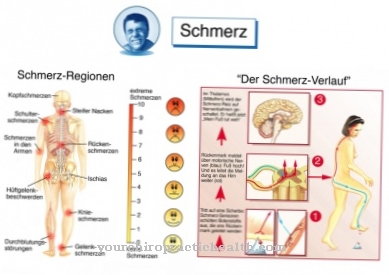The temporomandibular joint is one of the most stressed joints. It is always involved in eating, speaking, yawning. Sometimes there are more or less strong ones Jaw painthat affect people's ability to eat, drink and speak.
What is jaw pain?

Jaw pain is understood to mean all types of pain that affect the jaw apparatus and that are treated differently depending on their causes.
Jaw pain is torture for those affected. It usually lasts for weeks, if not months. They interfere with chewing, speaking, and even drinking. Most people then instinctively resort to painkillers, but a quick trip to the dentist would usually be much more suitable to get rid of the pain.
The jaw itself, which triggers the symptoms, is known to be divided into the upper and lower jaw. In the differential diagnosis of jaw pain, a broken jaw or jaw misalignment should also be considered.
causes
One of the main causes of jaw pain is crunching at night. As a result, the teeth are pressed together, the chewing surfaces of the teeth are heavily worn and the masticatory muscles are excessively stressed.
A viral or bacterial inflammation can be to blame for jaw pain when viruses or bacteria spread through the gums to the jaw and cause severe discomfort there due to the inflammation. Inflammation of the gingival pockets can also spread to the jaw via the roots and cause severe jaw pain.
A carious tooth can form a pus, a fistula, at the root. This focus spreads into the jaw and causes jaw pain. If left untreated, complications such as heart problems or kidney disease can follow and these organs can be severely damaged.
Misaligned teeth often lead to severe jaw pain, often originating from the wisdom teeth that press against other teeth from the jaw. A bad bite can also cause persistent jaw pain, as can muscle tension in the jaw or head area.
Sudden jaw pain can also be a warning sign of a heart attack, especially if it occurs in the lower jaw area and the pain radiates to the left arm.
You can find your medication here
➔ Toothache medicationDiseases with this symptom
- Caries
- Heart attack
- Tonsillitis
Diagnosis & course
Most jaw pain belongs in the hands of a doctor, dentist, or orthodontist. For mild temporomandibular joint complaints e.g. B. by grinding, a visit to the dentist is enough to clarify the cause. The dentist looks at the teeth, takes an X-ray and, if necessary, refers to the orthodontist if there are complaints due to serious misaligned teeth.
Jaw pain beneath individual teeth or dental fistulas is diagnosed when a dentist examines the teeth and takes an x-ray to show the extent of the inflammation.
If a heart attack is suspected, the emergency doctor should be called immediately and the person concerned should be positioned and reassured accordingly. The emergency doctor performs an EKG and directs the patient to the nearest hospital, where an extensive EKG and the initiation of treatment and monitoring takes place in the intensive care unit.
Complications
A dentist must often be consulted with jaw pain. For many people, the very thought of it triggers fear and panic. You become hysterical and need psychological support. If you avoid a visit to the dentist due to fear, the pain will spread. The mood is lowered and irritability sets in.
The jaw pain often leads to an impairment of the swallowing act. Food intake and fluid intake are reduced. Weight loss occurs. In severe cases, an eating disorder or dehydration threatens life-threatening complications. Jaw pain is experienced as particularly intense. When taking pain relievers, there is a risk of side effects, such as gastrointestinal problems or developing addiction.
The pain often leads to insomnia. The jaw pain often causes headaches and tension in the neck and neck. Treatment can last for several weeks. The pain can increase in intensity during this time. The jaw pain is not always completely cured.
Surgical interventions are possible if the jaw is misaligned. Wearing braces only leads to changes in the long term over several years. In addition, there is an optical flaw. This is experienced as emotionally stressful, especially by patients who are of an adult age.
When should you go to the doctor?
Jaw pain should always be clarified by a specialist. This is especially true for particularly severe pain that radiates into the head and persists over a longer period of time. A visit to the doctor is also recommended in the case of speech disorders or if swelling or inflammation in the jaw area can be observed accompanying the pain. If there are extreme speech or chewing problems, an orthodontist must also be called in. Possibly a misplaced wisdom tooth that can be quickly removed with medical help is the cause. Carious teeth can also be treated easily.
If left untreated, however, they can cause heart problems and kidney disease. Often the symptoms are also based on harmless tension, which can be treated with simple therapeutic measures. Acute, very severe jaw pain should be treated by an orthodontist or dentist. Patients with previous illnesses or malpositions should discuss any abnormalities in the jaw area with their family doctor. This also applies if no clear cause of the symptoms can be found. If there is severe pain in the lower jaw, which radiates into the left arm, the emergency services must be called immediately.
Doctors & therapists in your area
Treatment & Therapy
Treatment for jaw pain is based on the causes. In the case of tension-related jaw pain, it is sufficient to loosen and relax the jaw through appropriate relaxation exercises or more frequent breaks. Orthodontists correct misalignments with brackets that correct the misalignments. Pain pills should only be a short-term solution.
Bacterial inflammation is cured with an antibiotic so that the inflammation does not spread to the jaw and from there to other organs.
If a dental fistula has formed on a carious tooth, the dentist first tries to cure the inflammation with an antibiotic. If this does not help, an apicectomy is carried out to empty the fistula or, as a last resort, the tooth is extracted if all else fails.
A heart attack is generally treated in a clinic. The affected person is transferred to the intensive care unit and monitored there around the clock. Depending on the cause and extent of the heart attack, stents, bypasses or an operation are performed.
Outlook & forecast
In the case of jaw pain, the cause must always be investigated. But patients can also do something about acute treatment themselves. Often jaw pain is the result of nocturnal teeth grinding. In this case, a dental splint adapted by the dentist is helpful.
Heat can reduce pain in the area of the jaw. Moist, warm washcloths or infrared radiation are suitable. Red light may only be used at a distance of 30 cm. A warm full bath can relax the whole body and thus also reduce jaw pain. The more the jaw muscles are relieved, the better.
Pain patients should chew as little as possible and avoid long talking. Speaking with your mouth wide open is also not conducive to jaw pain. All compensatory activities that distract from the daily grind or stressful activities relax and can also reduce pain. The health insurance companies and adult education centers offer numerous relaxation courses.
Light exercise helps relieve tension. Jaw complaints are not infrequently caused by hardened muscles. Light exercises such as jaw circles are then helpful. Neck tension also often leads to jaw pain. Simple exercises like clasping your hands behind your neck and pressing against the back of your head can loosen the neck again.
Direct pain point treatment on the outer cheek can also bring relief. The pain point is right in front of the ear, between the edge of the lower jaw and the cheekbone.
You can find your medication here
➔ Toothache medicationprevention
Jaw pain cannot always be completely avoided. In the case of tension, it often helps to reduce stress in order to loosen up the tense muscles. Serious tooth misalignments must be corrected through extensive orthodontic measures. Regular prophylaxis at least once a year and a healthy, non-sugary diet help against tooth decay.
Living a healthy lifestyle that is not too stressful will help reduce the risk of a heart attack because stress leads to high blood pressure and damages the heart. Dental fistulas can be prevented with regular visits to the dentist and a healthy diet. A bite splint made by the dentist helps with nightly crunching.
You can do that yourself
If jaw pain occurs after a visit to the dentist, it does not need to be treated directly. Severe jaw pain can occur, especially after the wisdom teeth have been removed. These usually go away after a few days. The patient, on the other hand, can take pain medication and cool the affected area. If, in addition to the jaw pain, other symptoms such as headache, nausea or vomiting occur, a dentist should be consulted. In this case it is an infection. Painkillers shouldn't be taken for a long time as they can harm the stomach.
If the jaw pain is felt especially after waking up in the morning, it may be due to the grinding of teeth. It is helpful to have a dental splint made by the dentist, with which the nocturnal grinding can be prevented. The jaw is also relieved and no longer hurts.
It is not uncommon for jaw pain to occur due to hard food or overuse of the jaw. Stress can also contribute to jaw pain. The patient should consciously reduce stress in their everyday life and relax the jaw through soft food. Often the tension of the jaw occurs subconsciously. Here the patient himself has to be careful to relax the jaw during these moments. To do this, the tongue can be placed under the front teeth.












.jpg)



.jpg)










.jpg)
